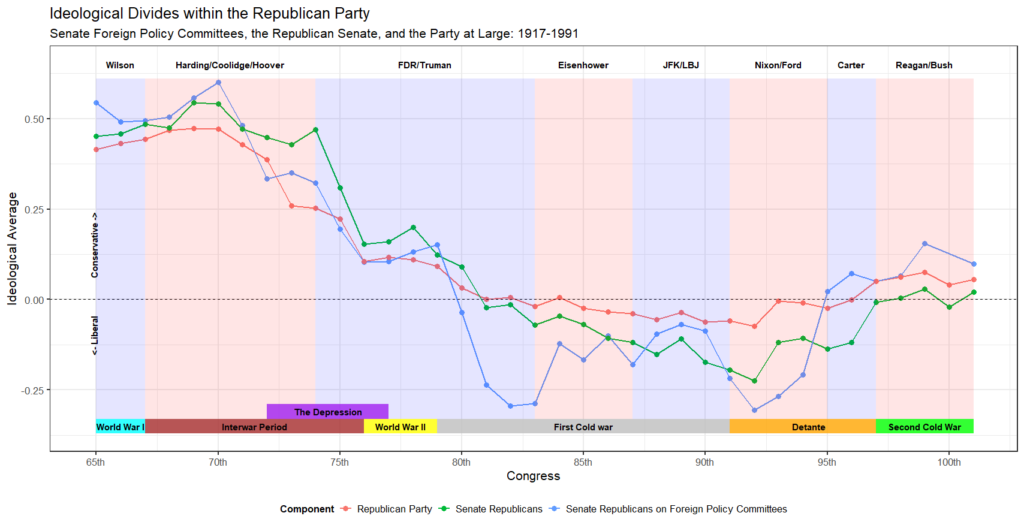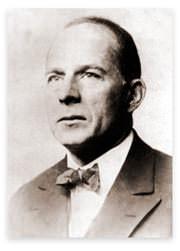During research for “Partisans of the Old Republic: Right-Wing Opposition to U.S. Foreign Policy, 1934-1992,” I have been vexed by one question more than any other: how much of the decline of “isolationism” can be attributed to individuals flipping from noninterventionism, versus a more extensive, generational evolution within the American right. I have been searching for a computational way to approach this problem for months.
Current scholarship on the decline of interventionism within the Republican party focuses on the importance of events. Political historians and national security scholars often cite the impact of World War II and Korea as being the combined death knells of the Old Right and their noninterventionist tendencies.
This thesis is supported by a deluge of Republicans who saw the light after World War II or the Korean War. The combination of a power vacuum left by the weakening of the British Empire coupled with the threat of the Soviet Union caused these holdouts to give up their noninterventionist tendencies in the name of fighting communism. The abrupt turn of Senator Arthur Vandenberg after WWII is a prime example of an individual evolution serving the impetus for the transformation of the GOP. The career of Rep. Robert Chiperfield is indicative of this trend within the House of Representatives after he flipped upon the start of the Korean War. A young Gerald Ford, then a Yale law student, was a founding member of the America First Committee. Hell, even Barry Goldwater opposed U.S. government policy in French Indochina during his first stint in the U.S. Senate (believe it or not).
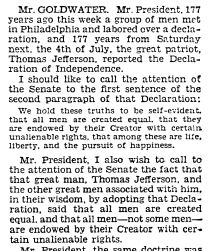

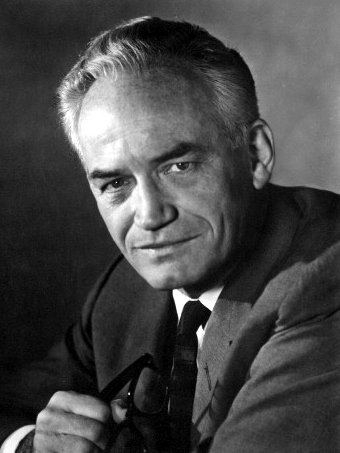
Despite such examples, the explanation of individual evolution has seemed lacking. I have been pouring (often obsessing) over this data for two years now, and there seem to be enough loose ends to challenge the importance of this thesis. How can I put it to the test using my dataset?
I may have stumbled upon a solution.
I decided to use the voting records that I have compiled thus far to determine how many congressional members manifested a noticeable decline in their opposition throughout their careers. Since I am looking for broader trends, I decided to limit my search to Representatives and Senators who served at least four congresses (eight years). Such a span would be more likely to cover a comprehensive array of events, presidential administration, wars, and changes into congressional governance. This sample will likely serve as a reliable proxy for the party as a whole.
| Name | Starting Opposition Mean | Ending Opposition Mean | Change | Wing of Party | Region | Generation |
|---|---|---|---|---|---|---|
| ADAIR, Edwin Ross | 0.519230769230769 | 0.336369770580297 | 0.182860998650472 | Center | Midwest | greatest |
| AIKEN, George David | 0.580227743271222 | 0.223141598825571 | 0.357086144445651 | Center | North | lost |
| ALLEN, Leo Elwood | 0.746212121212121 | 0.460714285714286 | 0.285497835497835 | Center | Midwest | lost |
| ANDERSEN, Herman Carl | 0.684027777777778 | 0.503968253968254 | 0.180059523809524 | Right | Midwest | lost |
| ANDERSON, John Bayard | 0.566666666666667 | 0.29983660130719 | 0.266830065359477 | Center | Midwest | greatest |
| ANDRESEN, August Herman | 0.825757575757576 | 0.496969696969697 | 0.328787878787879 | Right | Midwest | lost |
| ANDREWS, Walter Gresham | 0.781746031746032 | 0.0952380952380952 | 0.686507936507937 | Center | North | lost |
| ARENDS, Leslie Cornelius | 0.757692307692308 | 0.0904095904095904 | 0.667282717282717 | Center | Midwest | lost |
| ASHBROOK, John Milan | 0.647009966777409 | 0.395748855461086 | 0.251261111316323 | Right | Midwest | silent |
| BATES, George Joseph | 0.615056818181818 | 0.191666666666667 | 0.423390151515151 | Center | North | lost |
| BATTIN, James Franklin | 0.519642857142857 | 0.525641025641026 | -0.00599816849816848 | Right | Rockies | greatest |
| BEAMER, John Valentine | 0.519230769230769 | 0.522727272727273 | -0.00349650349650354 | Center | Midwest | lost |
| BENDER, George Harrison | 0.525 | 0.0839160839160839 | 0.441083916083916 | Center | Midwest | lost |
| BLACKNEY, William Wallace | 0.654545454545455 | 0.393939393939394 | 0.260606060606061 | Center | Midwest | missionary |
| BRADLEY, Frederick Van Ness | 0.639194139194139 | 0.916666666666667 | -0.277472527472528 | Center | Midwest | lost |
| BREWSTER, Ralph Owen | 0.846153846153846 | 0.422857142857143 | 0.423296703296703 | Center | North | lost |
| BRICKER, John William | 0.536062378167641 | 0.457516339869281 | 0.0785460382983603 | Right | Midwest | lost |
| BROCK, William Emerson, III | 0.507440476190476 | 0.198234155781326 | 0.309206320409151 | Center | South | silent |
| BROOKS, Charles Wayland | 0.6 | 0.597953216374269 | 0.00204678362573096 | Center | Midwest | lost |
| BROWN, Clarence J. | 0.578214578214578 | 0.553571428571429 | 0.0246431496431496 | Center | Midwest | lost |
| BROYHILL, James Thomas | 0.524193548387097 | 0.271634615384615 | 0.252558933002481 | Right | South | greatest |
| BUDGE, Hamer Harold | 0.557692307692308 | 0.568103448275862 | -0.0104111405835543 | Right | Rockies | greatest |
| BUFFETT, Howard Homan | 0.516624040920716 | 0.741666666666667 | -0.225042625745951 | Right | Midwest | greatest |
| BURDICK, Usher Lloyd | 0.742424242424242 | 0.576190476190476 | 0.166233766233766 | Left | Midwest | missionary |
| BURTON, Laurence Junior | 0.507211538461538 | 0.381756756756757 | 0.125454781704782 | Right | Rockies | greatest |
| BUTLER, Hugh Alfred | 0.638211382113821 | 0.641025641025641 | -0.00281425891181986 | Right | Midwest | missionary |
| CAPEHART, Homer Earl | 0.553571428571429 | 0.467908902691511 | 0.0856625258799172 | Center | Midwest | lost |
| CAPPER, Arthur | 0.870588235294118 | 0.359649122807018 | 0.5109391124871 | Right | Midwest | missionary |
| CARLSON, Frank | 0.958333333333333 | 0.193627450980392 | 0.764705882352941 | Center | Midwest | lost |
| CARTER, Albert Edward | 0.527272727272727 | 0.3 | 0.227272727272727 | Center | West | missionary |
| CASE, Francis Higbee | 0.85 | 0.450828157349896 | 0.399171842650104 | Right | Midwest | lost |
| CHIPERFIELD, Robert Bruce | 0.616287878787879 | 0.0540540540540541 | 0.562233824733825 | Center | Midwest | lost |
| CHURCH, Ralph Edwin | 0.742424242424242 | 0.875 | -0.132575757575758 | Center | Midwest | lost |
| CLANCY, Donald Daniel | 0.510569105691057 | 0.457983834070459 | 0.0525852716205978 | Center | Midwest | greatest |
| CLASON, Charles Russell | 0.693181818181818 | 0.0833333333333333 | 0.609848484848485 | Center | North | lost |
| CLAUSEN, Donald Holst | 0.535555555555556 | 0.293956795187312 | 0.241598760368244 | Right | West | greatest |
| CLAWSON, Delwin Morgan | 0.581730769230769 | 0.430319333564734 | 0.151411435666035 | Right | West | greatest |
| CLEVENGER, Cliff | 0.625 | 0.557692307692308 | 0.0673076923076923 | Right | Midwest | lost |
| COLE, William Sterling | 0.773504273504274 | 0.136363636363636 | 0.637140637140637 | Center | North | greatest |
| COLLIER, Harold Reginald | 0.582010582010582 | 0.313218390804598 | 0.268792191205984 | Center | Midwest | greatest |
| CORBETT, Robert James | 0.529185867895545 | 0.13452380952381 | 0.394662058371736 | Center | North | greatest |
| CORDON, Guy | 0.522727272727273 | 0.340909090909091 | 0.181818181818182 | Right | West | lost |
| CRAWFORD, Fred Lewis | 0.875 | 0.666666666666667 | 0.208333333333333 | Right | Midwest | lost |
| CULKIN, Francis Dugan | 0.9 | 0.166666666666667 | 0.733333333333333 | Center | North | missionary |
| CUNNINGHAM, Glenn Clarence | 0.5503663003663 | 0.33531746031746 | 0.21504884004884 | Center | Midwest | greatest |
| CURTIS, Carl Thomas | 0.644230769230769 | 0.328048780487805 | 0.316181988742964 | Center | Midwest | greatest |
| DAVIS, James John | 0.645833333333333 | 0.472838137472284 | 0.172995195861049 | Right | North | missionary |
| DERWINSKI, Edward Joseph | 0.578289473684211 | 0.209869333527995 | 0.368420140156216 | Center | Midwest | greatest |
| DEVINE, Samuel Leeper | 0.610714285714286 | 0.422822937968644 | 0.187891347745642 | Right | Midwest | greatest |
| DICKINSON, William Louis | 0.611695906432749 | 0.282668881506091 | 0.329027024926658 | Center | South | greatest |
| DIRKSEN, Everett McKinley | 0.622727272727273 | 0.195024077046549 | 0.427703195680724 | Center | Midwest | lost |
| DITTER, John William | 0.696969696969697 | 0.271428571428571 | 0.425541125541126 | Center | North | lost |
| DOLE, Robert Joseph | 0.564891222805701 | 0.165378464818763 | 0.399512757986938 | Center | Midwest | greatest |
| DONDERO, George Anthony | 0.763636363636364 | 0.406593406593407 | 0.357042957042957 | Center | Midwest | lost |
| DOUGLAS, Fred James | 0.792338709677419 | 0.19047619047619 | 0.601862519201229 | Center | North | missionary |
| DUNCAN, John James | 0.566106804478897 | 0.195652173913043 | 0.370454630565854 | Right | South | greatest |
| DWORSHAK, Henry Clarence | 0.601136363636364 | 0.666666666666667 | -0.0655303030303032 | Right | Rockies | lost |
| EATON, Charles Aubrey | 0.738636363636364 | 0.0625 | 0.676136363636364 | Center | North | missionary |
| EDWARDS, William Jackson (Jack) | 0.515350877192982 | 0.18055152394775 | 0.334799353245232 | Right | South | silent |
| ELSTON, Charles Henry | 0.577323717948718 | 0.514285714285714 | 0.0630380036630037 | Center | Midwest | lost |
| ENGEL, Albert Joseph | 0.821969696969697 | 0.166666666666667 | 0.65530303030303 | Center | Midwest | lost |
| FISH, Hamilton | 0.714285714285714 | 0.236363636363636 | 0.477922077922078 | Center | North | lost |
| GEORGE, Myron Virgil | 0.791666666666667 | 0.253105590062112 | 0.538561076604555 | Center | Midwest | lost |
| GIFFORD, Charles Laceille | 0.738888888888889 | 0.65 | 0.0888888888888889 | Center | North | missionary |
| GILCHRIST, Fred Cramer | 0.821428571428571 | 0.29375 | 0.527678571428571 | Right | Midwest | missionary |
| GILLIE, George W. | 0.556743421052632 | 0.608333333333333 | -0.0515899122807018 | Center | Midwest | missionary |
| GOLDWATER, Barry Morris | 0.716970998925886 | 0.132343611216851 | 0.584627387709035 | Right | Southwest | greatest |
| GRAHAM, Louis Edward | 0.533333333333333 | 0.291666666666667 | 0.241666666666667 | Center | North | missionary |
| GRANT, Robert Allen | 0.581597222222222 | 0.456845238095238 | 0.124751984126984 | Center | Midwest | greatest |
| GROSS, Harold Royce | 0.717948717948718 | 0.675249169435216 | 0.042699548513502 | Right | Midwest | lost |
| GURNEY, Edward John | 0.590659340659341 | 0.211289092295957 | 0.379370248363383 | Right | South | greatest |
| GUYER, Ulysses Samuel | 0.883116883116883 | 0.330128205128205 | 0.552988677988678 | Right | Midwest | missionary |
| GWYNNE, John Williams | 0.787878787878788 | 0.571428571428571 | 0.216450216450216 | Right | Midwest | lost |
| HALL, Durward Gorham | 0.607657657657658 | 0.450500770416025 | 0.157156887241633 | Right | Midwest | greatest |
| HALLECK, Charles Abraham | 0.734615384615385 | 0.2618825722274 | 0.472732812387985 | Center | Midwest | lost |
| HANCOCK, Clarence Eugene | 0.651515151515151 | 0.155263157894737 | 0.496251993620415 | Center | North | lost |
| HANSEN, George Vernon | 0.544444444444444 | 0.341801928957892 | 0.202642515486552 | Right | Rockies | silent |
| HARDEN, Cecil Murray | 0.518181818181818 | 0.171264367816092 | 0.346917450365726 | Center | Midwest | lost |
| HARNESS, Forest Arthur | 0.627467105263158 | 0.650724637681159 | -0.0232575324180015 | Center | Midwest | lost |
| HARRISON, Robert Dinsmore | 0.644230769230769 | 0.464285714285714 | 0.179945054945055 | Right | Midwest | lost |
| HARRISON, William Henry | 0.541958041958042 | 0.51778329197684 | 0.0241747499812015 | Right | Rockies | lost |
| HARSHA, William Howard | 0.529824561403509 | 0.451813922032752 | 0.0780106393707567 | Right | Midwest | greatest |
| HARTLEY, Fred Allan, Jr. | 0.577777777777778 | 0.302631578947368 | 0.275146198830409 | Center | North | greatest |
| HESS, William Emil | 0.681818181818182 | 0.12962962962963 | 0.552188552188552 | Center | Midwest | lost |
| HOFFMAN, Clare Eugene | 0.809090909090909 | 0.766666666666667 | 0.0424242424242425 | Right | Midwest | missionary |
| HOFFMAN, Richard William | 0.693181818181818 | 0.558441558441558 | 0.13474025974026 | Center | Midwest | lost |
| HOPE, Clifford Ragsdale | 0.884615384615385 | 0 | 0.884615384615385 | Right | Midwest | lost |
| HRUSKA, Roman Lee | 0.538461538461538 | 0.179924242424242 | 0.358537296037296 | Center | Midwest | greatest |
| HULL, Merlin | 0.866666666666667 | 0.748251748251748 | 0.118414918414918 | Left | Midwest | missionary |
| HUTCHINSON, J. Edward | 0.545039561777237 | 0.482936507936508 | 0.0621030538407288 | Center | Midwest | greatest |
| JENKINS, Thomas Albert | 0.755244755244755 | 0.293939393939394 | 0.461305361305361 | Center | Midwest | missionary |
| JENNER, William Ezra | 0.586666666666667 | 0.847222222222222 | -0.260555555555556 | Right | Midwest | greatest |
| JENSEN, Benton Franklin | 0.576190476190476 | 0.59047619047619 | -0.0142857142857143 | Right | Midwest | lost |
| JOHANSEN, August Edgar | 0.517857142857143 | 0.647465437788018 | -0.129608294930876 | Right | Midwest | greatest |
| JOHNSON, Anton Joseph | 0.65034965034965 | 0.776785714285714 | -0.126436063936064 | Right | Midwest | missionary |
| JOHNSON, James Paul (Jim) | 0.521312260536398 | 0.534666666666667 | -0.0133544061302682 | Center | Rockies | silent |
| JOHNSON, Noble Jacob | 0.632560483870968 | 0.58421052631579 | 0.0483499575551782 | Center | Midwest | lost |
| JONES, Robert Franklin | 0.625 | 0.816666666666667 | -0.191666666666667 | Right | Midwest | greatest |
| JONKMAN, Bartel John | 0.615441176470588 | 0.311141304347826 | 0.304299872122762 | Center | Midwest | lost |
| JORDAN, Leonard Beck (Len) | 0.774898785425101 | 0.270088618938564 | 0.504810166486537 | Center | Rockies | lost |
| KEARNS, Carroll Dudley | 0.516666666666667 | 0.171052631578947 | 0.345614035087719 | Center | North | lost |
| KEEFE, Frank Bateman | 0.586111111111111 | 0.5 | 0.086111111111111 | Center | Midwest | lost |
| KINZER, John Roland | 0.742424242424242 | 0.361111111111111 | 0.381313131313131 | Center | North | missionary |
| KNUTSON, Harold | 0.866666666666667 | 0.821969696969697 | 0.0446969696969697 | Right | Midwest | missionary |
| LAMBERTSON, William Purnell | 0.829545454545455 | 0.678498985801217 | 0.151046468744238 | Right | Midwest | missionary |
| LANDIS, Gerald Wayne | 0.596217105263158 | 0.565340909090909 | 0.0308761961722488 | Center | Midwest | lost |
| LANGER, William | 0.667953667953668 | 0.621328224776501 | 0.0466254431771673 | Right | Midwest | lost |
| LEMKE, William | 0.787878787878788 | 0.785714285714286 | 0.00216450216450215 | Center | Midwest | missionary |
| LEWIS, Earl Ramage | 0.515151515151515 | 0.392045454545455 | 0.123106060606061 | Center | Midwest | lost |
| LODGE, Henry Cabot, Jr. | 0.527868852459016 | 0.0497685185185185 | 0.478100333940498 | Center | North | greatest |
| MAAS, Melvin Joseph | 0.566666666666667 | 0.356481481481482 | 0.210185185185185 | Center | Midwest | lost |
| MALONE, George Wilson | 0.72 | 0.75233918128655 | -0.0323391812865497 | Right | Rockies | lost |
| MARTIN, David Thomas | 0.556261343012704 | 0.325381879054195 | 0.230879463958509 | Right | Midwest | greatest |
| MARTIN, Joseph William, Jr. | 0.755555555555556 | 0.143939393939394 | 0.611616161616162 | Center | North | lost |
| MARTIN, Thomas Ellsworth | 0.51555023923445 | 0.154858299595142 | 0.360691939639308 | Center | Midwest | lost |
| MASON, Noah Morgan | 0.757142857142857 | 0.804812834224599 | -0.0476699770817418 | Right | Midwest | missionary |
| McCULLOCH, William Moore | 0.563636363636364 | 0.170230263157895 | 0.393406100478469 | Center | Midwest | greatest |
| McLEAN, Donald Holman | 0.646153846153846 | 0.194594594594595 | 0.451559251559251 | Center | North | lost |
| McNARY, Charles Linza | 0.583333333333333 | 0.5 | 0.0833333333333333 | Right | West | missionary |
| McVEY, William Estus | 0.606060606060606 | 0.584045584045584 | 0.0220150220150219 | Center | Midwest | lost |
| MICHEL, Robert Henry | 0.609962406015038 | 0.145959595959596 | 0.464002810055442 | Center | Midwest | greatest |
| MICHENER, Earl Cory | 0.821212121212121 | 0.177884615384615 | 0.643327505827506 | Center | Midwest | missionary |
| MILLER, Jack Richard | 0.554945054945055 | 0.197302923341479 | 0.357642131603576 | Center | Midwest | greatest |
| MOORE, Arch Alfred, Jr. | 0.544973544973545 | 0.465023847376789 | 0.0799496975967563 | Center | South | greatest |
| MORSE, Wayne Lyman | 0.526315789473684 | 0.176470588235294 | 0.34984520123839 | Left | West | lost |
| MOTT, James Wheaton | 0.55 | 0.0277777777777778 | 0.522222222222222 | Center | West | lost |
| MUNDT, Karl Earl | 0.530681818181818 | 0.158708414872798 | 0.37197340330902 | Center | Midwest | lost |
| MURRAY, Reid Fred | 0.674242424242424 | 0.541666666666667 | 0.132575757575758 | Center | Midwest | lost |
| NELSON, Charles Pembroke | 0.555555555555556 | 0.477272727272727 | 0.0782828282828283 | Center | North | greatest |
| NYE, Gerald Prentice | 0.888888888888889 | 0.584345479082321 | 0.304543409806568 | Right | Midwest | lost |
| O'KONSKI, Alvin Edward | 0.596491228070175 | 0.501754385964912 | 0.0947368421052631 | Right | Midwest | greatest |
| OSMERS, Frank Charles, Jr. | 0.645104895104895 | 0.0536130536130536 | 0.591491841491842 | Center | North | greatest |
| PAUL, Ronald Ernest | 0.73579418344519 | 0.721784663320062 | 0.0140095201251278 | Right | Southwest | silent |
| PITTENGER, William Alvin | 0.56969696969697 | 0.398947368421053 | 0.170749601275917 | Center | Midwest | lost |
| PLUMLEY, Charles Albert | 0.696969696969697 | 0.362637362637363 | 0.334332334332334 | Center | North | missionary |
| POWERS, David Lane | 0.73030303030303 | 0.142156862745098 | 0.588146167557932 | Center | North | lost |
| PRESSLER, Larry Lee | 0.531540797335684 | 0.235407782515991 | 0.296133014819693 | Center | Midwest | silent |
| QUILLEN, James Henry | 0.573333333333333 | 0.286630036630037 | 0.286703296703297 | Right | South | greatest |
| REECE, Brazilla Carroll | 0.631818181818182 | 0.399470899470899 | 0.232347282347282 | Right | South | lost |
| REED, Chauncey William | 0.709090909090909 | 0.5 | 0.209090909090909 | Center | Midwest | lost |
| REED, Clyde Martin | 0.724916943521595 | 0.140522875816993 | 0.584394067704601 | Right | Midwest | missionary |
| REED, Daniel Alden | 0.75 | 0.485119047619048 | 0.264880952380952 | Right | North | missionary |
| REES, Edward Herbert | 0.878787878787879 | 0.441379310344828 | 0.437408568443051 | Center | Midwest | lost |
| REID, Charlotte Thompson | 0.5815649867374 | 0.2324016563147 | 0.349163330422701 | Center | Midwest | greatest |
| REVERCOMB, William Chapman | 0.735645933014354 | 0.533549783549784 | 0.202096149464571 | Right | South | lost |
| RICH, Robert Fleming | 0.958333333333333 | 0.837662337662338 | 0.120670995670996 | Right | North | lost |
| ROBSION, John Marshall | 0.716783216783217 | 0.741071428571429 | -0.0242882117882117 | Right | South | missionary |
| RODGERS, Robert Lewis | 0.51008064516129 | 0.319548872180451 | 0.190531772980839 | Center | North | missionary |
| ROUDEBUSH, Richard Lowell | 0.558284457478006 | 0.395089285714286 | 0.16319517176372 | Right | Midwest | greatest |
| ROUSSELOT, John Harbin | 0.655677655677656 | 0.353643724696356 | 0.302033930981299 | Right | West | greatest |
| SCHADEBERG, Henry Carl | 0.615222876366695 | 0.440587867417136 | 0.174635008949559 | Center | Midwest | greatest |
| SCHERLE, William Joseph | 0.506678281068525 | 0.475033738191633 | 0.0316445428768921 | Right | Midwest | greatest |
| SCHOEPPEL, Andrew Frank | 0.662352941176471 | 0.59375 | 0.0686029411764706 | Right | Midwest | lost |
| SCRIVNER, Errett Power | 0.613333333333333 | 0.467592592592593 | 0.145740740740741 | Center | Midwest | lost |
| SHAFER, Paul Werntz | 0.861538461538462 | 0.583333333333333 | 0.278205128205128 | Center | Midwest | lost |
| SHEEHAN, Timothy Patrick | 0.618181818181818 | 0.576923076923077 | 0.0412587412587413 | Center | Midwest | greatest |
| SHIPSTEAD, Henrik | 0.833333333333333 | 0.848684210526316 | -0.0153508771929824 | Right | Midwest | missionary |
| SHORT, Dewey Jackson | 0.696969696969697 | 0.5 | 0.196969696969697 | Right | Midwest | lost |
| SHUSTER, E. G. (Bud) | 0.565978573295009 | 0.294799054373522 | 0.271179518921487 | Right | North | silent |
| SILER, Eugene | 0.58 | 0.634848484848485 | -0.0548484848484847 | Right | South | lost |
| SIMPSON, Richard Murray | 0.65 | 0.203333333333333 | 0.446666666666667 | Center | North | lost |
| SKUBITZ, Joe | 0.509453781512605 | 0.363830858293481 | 0.145622923219124 | Right | Midwest | greatest |
| SMITH, Frederick Cleveland | 0.684090909090909 | 0.964285714285714 | -0.280194805194805 | Right | Midwest | lost |
| SMITH, H. Allen | 0.595238095238095 | 0.34219001610306 | 0.253048079135036 | Right | West | greatest |
| SMITH, Wint | 0.783333333333333 | 0.645833333333333 | 0.1375 | Right | Midwest | lost |
| SNYDER, Marion Gene | 0.59072249589491 | 0.319601677148847 | 0.271120818746063 | Right | South | silent |
| SPRINGER, Raymond Smiley | 0.593939393939394 | 0.7 | -0.106060606060606 | Center | Midwest | missionary |
| STEFAN, Karl | 0.923076923076923 | 0.596153846153846 | 0.326923076923077 | Right | Midwest | lost |
| SUMNER, Jessie | 0.663636363636364 | 0.696524064171123 | -0.0328877005347594 | Right | Midwest | lost |
| SYMMS, Steven Douglas | 0.581144465290807 | 0.19786581113126 | 0.383278654159547 | Right | Rockies | silent |
| TABER, John | 0.67948717948718 | 0.417582417582418 | 0.261904761904762 | Right | North | missionary |
| TAFT, Robert Alphonso | 0.633684621389539 | 0.176470588235294 | 0.457214033154245 | Center | Midwest | lost |
| TALLE, Henry Oscar | 0.53125 | 0.437037037037037 | 0.094212962962963 | Center | Midwest | lost |
| TAYLOR, Gene | 0.515664160401002 | 0.230152161456675 | 0.285511998944327 | Right | Midwest | silent |
| THOMAS, John | 0.695394736842105 | 0.59375 | 0.101644736842105 | Right | Rockies | missionary |
| THOMAS, John Parnell | 0.631493506493507 | 0.233766233766234 | 0.397727272727273 | Center | North | lost |
| THOMSON, Vernon Wallace | 0.533333333333333 | 0.177145612343298 | 0.356187720990035 | Center | Midwest | greatest |
| TIBBOTT, Harve | 0.525675675675676 | 0.31547619047619 | 0.210199485199485 | Center | North | lost |
| TOBEY, Charles William | 0.95 | 0.5 | 0.45 | Center | North | missionary |
| TOWER, John Goodwin | 0.7734375 | 0.112903225806452 | 0.660534274193548 | Center | Southwest | greatest |
| TREADWAY, Allen Towner | 0.701388888888889 | 0.222222222222222 | 0.479166666666667 | Center | North | missionary |
| UTT, James Boyd | 0.516666666666667 | 0.55 | -0.0333333333333334 | Right | West | lost |
| VAN PELT, William Kaiser | 0.613095238095238 | 0.636904761904762 | -0.0238095238095237 | Right | Midwest | greatest |
| VAN ZANDT, James Edward | 0.504385964912281 | 0.0481997677119628 | 0.456186197200318 | Center | North | lost |
| VANDENBERG, Arthur Hendrick | 0.678571428571429 | 0.025 | 0.653571428571429 | Center | Midwest | lost |
| VELDE, Harold Himmel | 0.625874125874126 | 0.310606060606061 | 0.315268065268065 | Center | Midwest | greatest |
| VORYS, John Martin | 0.551282051282051 | 0.131054131054131 | 0.42022792022792 | Center | Midwest | lost |
| VURSELL, Charles Wesley | 0.518382352941176 | 0.10989010989011 | 0.408492243051067 | Center | Midwest | missionary |
| WEAVER, Phillip Hart | 0.516483516483516 | 0.434210526315789 | 0.0822729901677269 | Right | Midwest | greatest |
| WHERRY, Kenneth Spicer | 0.82516339869281 | 0.69047619047619 | 0.13468720821662 | Right | Midwest | lost |
| WIGGLESWORTH, Richard Bowditch | 0.503246753246753 | 0.0714285714285714 | 0.431818181818182 | Center | North | lost |
| WILEY, Alexander | 0.725396825396825 | 0.106671554252199 | 0.618725271144626 | Center | Midwest | lost |
| WILLIAMS, John James | 0.704678362573099 | 0.428599425137183 | 0.276078937435916 | Right | South | greatest |
| WINTER, Thomas Daniel | 0.623563218390805 | 0.548701298701299 | 0.074861919689506 | Right | Midwest | lost |
| WITHROW, Gardner Robert | 0.723776223776224 | 0.574712643678161 | 0.149063580098063 | Center | Midwest | lost |
| WOLCOTT, Jesse Paine | 0.733333333333333 | 0.196428571428571 | 0.536904761904762 | Center | Midwest | lost |
| WOLFENDEN, James | 0.818181818181818 | 0.329044117647059 | 0.489137700534759 | Center | North | lost |
| WOLVERTON, Charles Anderson | 0.531818181818182 | 0.129166666666667 | 0.402651515151515 | Center | North | missionary |
| WOODRUFF, Roy Orchard | 0.691666666666667 | 0.646153846153846 | 0.0455128205128206 | Right | Midwest | missionary |
| WYMAN, Louis Crosby | 0.500384024577573 | 0.296232876712329 | 0.204151147865244 | Center | North | greatest |
I then took the oppositional average of each member’s first two and last two congresses. 200 Republican Representatives or Senators met the threshold, having served at least eight congresses and averaged an opposition to U.S. foreign policy above 50% during the start of their careers. Of those 200, 132 of them finished their careers (last two congresses) with an opposition percentage below 50%.
However, looking at our members’ generational and ideological components makes for a more complicated picture. There is a strong trend toward political centrism among those that evolved into interventionism. Of those 132 who “flipped,” 91 were within the party’s moderate core. A mere 40 who turned into interventionists could be considered on the party’s right flank.
There also appears to be have been a robust generational component at play. Members of the Greatest and Silent generations seem to be over-represented among those right-of-center Republicans who started their careers as noninterventionists but drifted into interventionism.

Plotting these members over time makes the evolution more apparent. Younger right-wing Republicans were considerably more likely to end their careers as interventionists despite beginning as noninterventionists.
Older right-wing noninterventionists largely stayed the course despite the events of the Cold War. Their attitudes appeared less prone to change due to the course of events or the presence of a Republican in the White House (Nixon or Eisenhower). Right-wing noninterventionists of the Missionary or Lost generations were over twice as likely to end their congressional careers as they started them, opposed to U.S. foreign policy. Nineteen of those members increased their opposition throughout their careers (as opposed to only seven centrists). Even among those that did moderate themselves, most did not finish far below the 50% threshold.
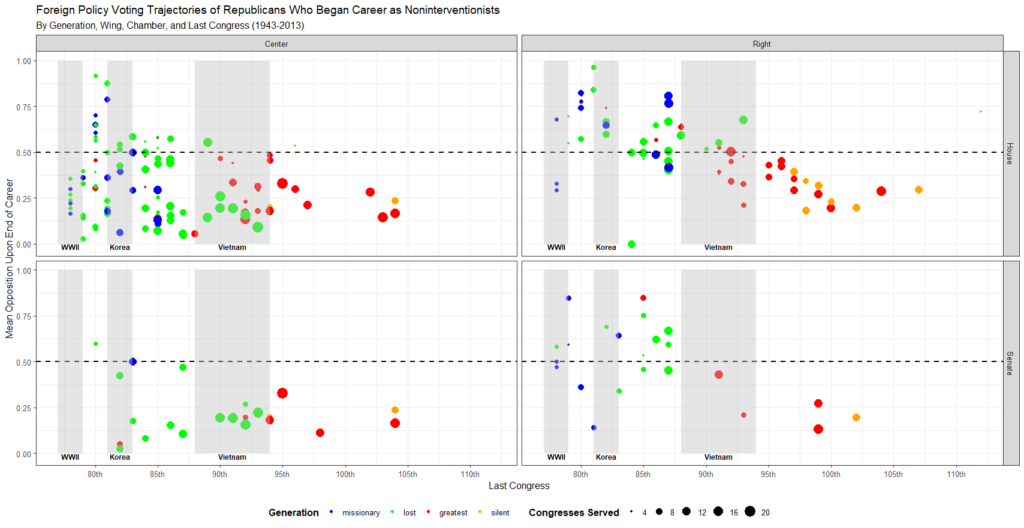
Conversely, centrist Republicans evolved in their foreign policy thinking considerably earlier, either during or due to World War II and the Korean War. The thesis that holds that the GOP turned towards interventionism only holds true for the party’s moderate core.
However, the Republican right essentially held on to its noninterventionist worldview despite the occurrences of early the Cold War. The right flank of the GOP would not fully convert into interventionism until a new generation of conservatives took office.
The New Right’s early opposition to U.S. foreign policy was a mirage and was less rooted in principle than the “isolationism” of the Old Right. During the height of the Vietnam War, Republican opposition to U.S. foreign policy was often purely partisan. Members in the House and the Senate would often rationalize their desire to cut foreign aid and other programs because of the cost of fighting in Southeast Asia. There was also a desire among Republicans to obstruct the Johnson administration. For many Republicans, the military’s failure in Vietnam could be laid at the door of the White House. As such, the right’s generalized opposition to American foreign policy was a redirected frustration with the Vietnam War.

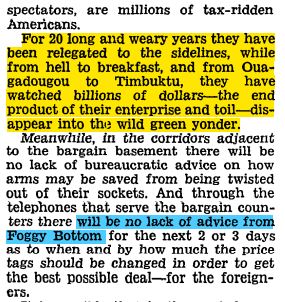
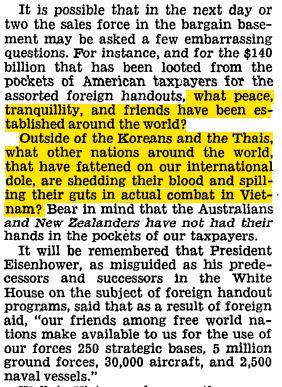
Gross, H.R., speaking on H.R. 12048, 90th Congress, 1st sess. Congressional Record 113, pt.18 p. 23605.
This contextual opposition is manifested in their voting records. There is a noticeable gap between the Republican party’s total foreign policy opposition v. their final vote opposition on the eve of the Vietnam War and through its escalation. Many Republicans would vote to cut funding or otherwise limit programs during floor amendments while ultimately voting “yay” on the final rollcall vote.
While such limited opposition was not new to the Vietnam era, its escalation suggests that GOP’s opposition to foreign policy became more political and less principled as a new generation of Republicans took office. Right-wing Republicans of the Missionary and Lost generations were considerably more likely to vote on principle and politics. Their opposition remained high throughout the early Cold War despite events and a Republican in the White House (Eisenhower, 1953-1961).

This gap between principled and political opposition manifested itself on the campaign trail as well. In 1968, retired Republican representative Eugene Siler (K.Y.) decided to run for an open Senate seat vacated by Thurston Morton. Siler was the only dissenting vote within the U.S. House on the Gulf of Tonkin Resolution. Additionally, Siler opposed the legislative precursors explicitly mentioned in that resolution. He voted against the delegation of authority to the president to defend the Republic of China’s redoubt on the island of Formosa (Taiwan), one of only three representatives to vote no. He also opposed the Eisenhower Doctrine, which expanded the U.S. government’s footprint within the Middle East and delegated to the president the authority to use military force in the region. Siler is the only Representative to oppose all three. In addition to these landmarks, he consistently voted against measures that unilaterally vested power in the executive branch to make foreign policy decisions and opposed most U.S. foreign aid programs.
When Siler formerly accounted for his candidacy he led with a policy on Vietnam that called for a gradual withdrawal of all U.S. forces from the conflict. Siler also used his announcement to take shots at his assumed rivals, many of whom had become newfound opponents of the war. He quipped that “another ahead-of-my-time viewpoint I have maintained for several years is that we ought to be waging peace instead of war,” and added, “I never believed we should fight any wars except defensive ones.” After a winnowing of the field, the primary came down to Eugene Siler and lawyer Marlow Cook.

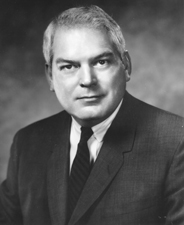
The juxtaposition between these two men was symbolic of the ideological, cultural, and generational divisions within the Republican Party. Cook (born, 1926), a former state legislator, was a transplant from upstate New York and resident of Kentucky’s largest city, Louisville. Siler was a native-born Kentuckian (1900) and a self-described hillbilly. Cook was Catholic, Siler was Protestant. The localities that these men represented were more than mere geographical regions but embodied the two power bases of the Kentucky GOP, one static and the other ascendant. Siler’s rural 5th district had for decades constituted the party’s predominant source of votes in statewide elections and had continuously sent a Republican representative to Washington for over 30 years. Cook’s Jefferson County (which contained Louisville) was one of the many growing suburban hubs of the Republican party and its New Right coalition.
Siler’s platform reflected the growing rift between the party’s two wings. Despite Siler’s opposition to Vietnam, his political views were outside the mainstream, even in a conservative state such as Kentucky. In addition to his opposition to war and foreign aid, Siler supported a balanced budget without caveats and advocated for the withdrawal of all U.S. forces stationed in Europe. Campaign watchers also considered Siler’s social and religious conservatism a political handicap. He was a proud teetotaler (a liability in a state known for its Bourbon), personally opposed divorce, and supported religious instruction in public schools. Cook lacked some of the conservative baggage exhibited by Siler but also dissented on the war in Vietnam (albeit for political reasons). Cook was initially noncommitted to the conflict. During an early debate between the two candidates, Siler declared the conflict “immoral and unconstitutional,” and Cook declined to comment due to ongoing negotiations.
Cook made his position clear as the campaign wore on, but it contrasted significantly to Siler’s. Like the outgoing Thurston Morton, he couched his opposition in the language of political frustration with the Johnson administration and its prosecution of the war. By May 1968, he advocated for withdrawal because the United States could not win “a war conducted by the State Department and Executive Branch.” If the military isn’t going to be allowed to win, “he declared, “we ought to get out.“
Cook’s position was roughly corresponded to what the American which had grown weary of the war by 1968, as its cost in American blood and treasure mounted. Cook’s moderate domestic positions, coupled with a mainstream opposition to the war, meant that he courted a more comprehensive array of voters. His positions negated any political advantage that Siler might have from his antiwar stance.
As a result, Siler was soundly defeated by Marlow Cook on Tuesday, 28 May 1968. After spending 13 times as much on his campaign, Marlow Cook earned almost twice the votes. A lack of institutional party support further hamstrung Siler. Initial postmortems of his campaign from voters and local political commentators cited his age, conservatism, localism, and “peculiar brand of isolationism” as reasons for his defeat. Cook would beat his Democratic opponent, Katherine Peden, in the general election. From the 91st until 93rd Congresses, Cook posted a mere 32% opposition to U.S. foreign policy.
The divisiveness of the war in Vietnam and its association with the Johnson administration allowed moderates like Morton to assail the war without questioning its underlying assumptions, along with the political programs which preceded it. Meanwhile, Siler, who opposed the war from the start based on long-standing principles, was undercut and politically hamstrung by his conservative worldview.
A similar phenomenon occurred within the Democratic party. Elite members of the liberal establishment and the Democratic party argued that the failure of Vietnam ought not to be used to question the entirety of the American postwar empire and undermine “the cherished lessons of the thirties, [and] the war years.” In both parties, the Overton Window was narrowed, and the lessons of Vietnam were firmly attenuated into the realms of strategy or tactics, not moralism or constitutionality.
If we fast forward to those who entered office after the Vietnam War, we can see the generational transformation of the Republican party continued until right-wing noninterventionism was (almost) completely extinguished. Of the 349 Republicans from the Silent and Boomer generations who started their careers after the 90th Congress (1967-1969), only seven would post an opposition percentage above 50%. And, of them, none were Boomers, and only one of them, Ron Paul (Silent generation, born 1935), would serve into and beyond the Reagan era. During the Second Cold War, on the issue of foreign policy, younger Republicans voted more like Old Left Democrats than their conservative forebears.
| Rank | Party | Generation | Opposition % | Number | Avg. Birth Year | % of Body |
| 1 | Republican | boomer | 0.2543254 | 64 | 1949.766 | 0.03166749 |
| 2 | Republican | silent | 0.2783259 | 261 | 1936.126 | 0.12914399 |
| 3 | Republican | greatest | 0.2806877 | 93 | 1921.280 | 0.04601682 |
| 4 | Democrat | boomer | 0.3817476 | 77 | 1949.182 | 0.03809995 |
| 5 | Democrat | greatest | 0.3879735 | 124 | 1921.815 | 0.06135576 |
| 6 | Democrat | silent | 0.3962747 | 313 | 1937.294 | 0.1548738 |
So, what the hell happened? How is it that the center of the GOP was much more inclined to moderate itself due to the course of world events, while the Republican right was considerably less likely to do so? And why did it only transform after Vietnam?
Furthermore, why did it take a full generation for the Republican right to transform into interventionism, and why wasn’t the Old Right’s noninterventionism transmitted into later generations of conservatives?
I have a couple of hypotheses. First, is the “gatekeeping” function performed by conservative intellectuals like National Review’s William F. Buckley. Buckley exiled out of the conservative movement “ultra-right” figures like the John Birch Society, antiwar libertarians like Murray Rothbard, and radical individualists like Ayn Rand. Despite the flaws of these individuals, they all held on various heterodox (and prescient) ideas about the role of the U.S. in the world. The result of these purges was likely the expulsion of noninterventionism from the political and intellectual machinery of the emerging conservative movement.
A similar explanation may also lie with the machinations of Democratic presidents and regulatory agencies of the U.S. government. During the 1960s, the Federal Communications Commission used the politically motivated and selective enforcement of the Fairness Doctrine to undermine the first generation of conservative talk radio. Many of these radio commentators, like the controversial Dan Smoot, held on to deeply rooted noninterventionist ideas about foreign policy (despite their staunch anti-communism). The Internal Revenue Service also got in on the act and initiated politically motivated audits at the behest of President John F. Kennedy.
The combination of these purges and censorship, paired with the nationalization of the party politics, broke chains of transmission of noninterventionism within the political culture of the Republican right…or so goes my theory. Either way, the transformation of the Republican party was not merely a response to events but a long-term evolution of political culture between generations of political actors.
The goal now, for the sake of the dissertation, is to discover why…and how did these noninterventionist ideas survive their political exile.




